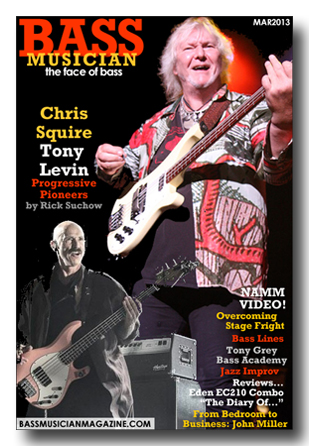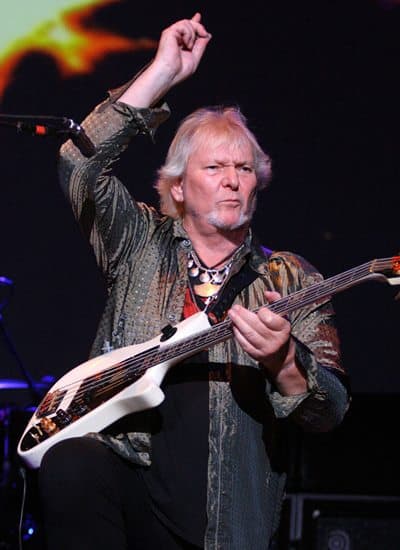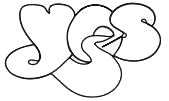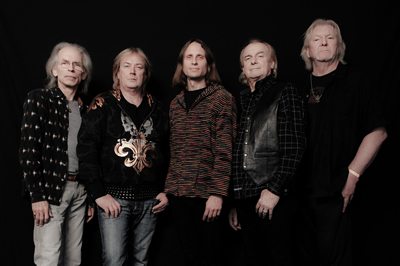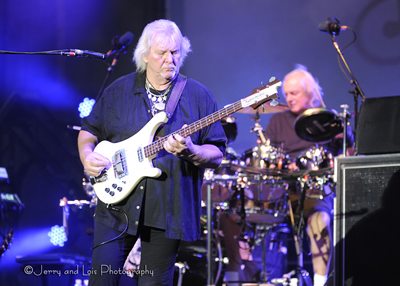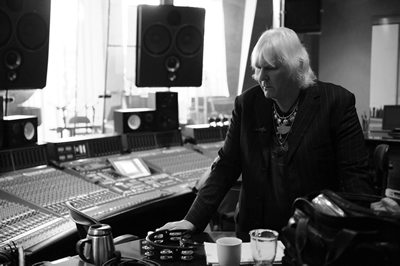Chris Squire Takes A Straight And Stronger Course
by Rick Suchow
(this article was published in Bass Musician Magazine March 2013)
I’m not really sure when the term “progressive rock” came to be, or for that matter, the more user-friendly “prog-rock”. Back in the day, when Yes first landed on everyone’s musical radar, the only term I recall using was “holy shit”. The band unleashed a ferocious series of albums the likes of which I’d never quite experienced before, and although there were other groups of that era working the new genre– King Crimson and Emerson, Lake & Palmer, to name two– Yes seemed to posses some extra, other-worldly dimension. What exactly it was, though, was not easy to define. Was it Steve Howe’s unique approach to guitar? Jon Anderson’s identifiable voice, or his pieces-of-a-puzzle lyrics? Was it Roger Dean’s artwork, with visual landscapes that took us to fragile planets, topographic oceans and closer to the edge? Perhaps at the end of the day, and certainly at its core, that extra dimension was the sound of Chris Squire on bass.
With a biting Rickenbacker 4001 upfront in the mix, playing angular, syncopated and surprise-ready bass lines, Squire took bassists to uncharted territory in the 70′s with Yes. Songs like “Yours Is No Disgrace”, “Siberian Khatru” and the 18-minute opus “Close To The Edge” were bass anthems in their own right, and those toiling in the low-end game were suddenly scurrying to their turntables and tape decks to figure out what the hell Chris was doing, and could they possibly do it themselves. Progressive rock? Probably. Progressive bass? Absolutely.
Okay, so let’s fast-forward about forty years to the present. After nearly 20 personnel changes and as many albums, Yes carries on. Chris is not only still the group’s anchor, but the only member to be there for the whole damn trip. Every record, every tour, every show… all of it. As others left the fold, returned to the fold, left again, sought out solo careers, other bands, and even other careers, the band’s name seemed to stretch from “Yes” to “Yes, but“. All except Squire, that is. To this day he remains steadfast, eyes on the bigger picture, staying the course. For him Yes is a still-unfolding journey, one that began a long time ago and rolls on into the future.
This year is shaping up to be one of Yes’ more notable chapters, as they revisit those massively successful early days with a tour that kicks off today and features the band performing three of their classic albums in their entirety. It’s a format they haven’t done in over 30 years, and fans will be treated to The Yes Album, Close To The Edge, and Going For The One played in full, start to finish, just as they were heard when originally released in the age of vinyl. Some of the faces have changed from those who actually crafted those recordings; Jon Anderson is replaced by his younger clone Jon Davison (check him out on YouTube), and Geoff Downes is on hand for the keyboard parts originally played by Tony Kaye and Rick Wakeman. But Steve Howe is still aboard, as is drummer Alan White, who joined Yes in 1972, replacing Bill Bruford after Close To The Edge.
I caught up with Chris earlier this year, just weeks before he and the band were gearing up for mid-February rehearsals in Los Angeles. Oh yeah, if you’ve noticed that he has a tendency to not smile for the camera, be assured: the big man is full of laughs, fun to talk with, and exudes positive energy worthy of, well… a band name like Yes.
_________________________________________________________
I was excited to hear that Yes will be performing three of the early albums in their entirety. Did you give any thought to going chronologically, and include Fragile rather than Going For The One?
Well, we decided to play those three for various reasons. As you know, The Yes Album was our first album that got Yes recognized on a worldwide basis, so we wanted to do that, and Close To The Edge was where we started with the side-long form pieces of music. Going For The One was a good progression from that, and was also the first album we made outside of the UK actually, we recorded it in Switzerland.
Let’s talk about those albums, since it was a very fruitful period in the band’s career. Eddie Offord produced the first two, The Yes Album and Close To The Edge. How much influence did he have on the actual music itself?
He didn’t really have any influence on the music or the composition, but had a major influence on the production and the sounds. Eddie, when we first met him, had excellent ears for a recording engineer, and a real good understanding of microphone techniques– like how to mic up the drum kit. It’s quite an involved science really, at the end of the day. Of course nowadays it’s much easier because people have learned they can just stick a microphone in front of something and get it to sound good with all the electronic wizardry we have now. But back then it was a lot more analog, and a lot more to do with atmospherics, etc. Eddie was a great partner with us in those productions.
How long did the two of you typically spend on recording and punching in bass parts, and how influential was he in your bass sound?
Back in those early days we used to play the back tracks pretty much with the whole band together. I guess we did repair work, but not a lot of it. That really developed more in the 80’s with the onset of digital and computers, of course, it all became much easier to be able to do that. But in the early days of Yes there was a lot of live playing with everyone together, and probably just the vocals were overdubbed, as far as I can remember. And guitar solos, keyboard solos, things like that. Eddie loved my sound, and then he recorded it in a certain way with use of Urei compressors and stuff that he understood real well in the studio. We kind of came out with my recorded sound together, in a way.
On these albums, Bill Bruford was the drummer on the first two, and then Alan White came in after Close To The Edge. How did you find working with Bill compared to working with Alan?
Well, it was odd really, because they’re very different as drummers. I think possibly that I was more of the “drummer” with Bill, who was more decorative and had an odd jazz-influenced style of drumming. Alan was more of a straight ahead rock drummer, as opposed to a jazz drummer. Of course Alan had to adapt to learning Bill Bruford’s style, which I don’t think was immediately easy for him at first. But he was up for the challenge, and so he kind of came up with a hybrid. And ever since then, of course, Alan’s been with the band and has been a great contributor to the music.
Had you considered any other drummers before Alan White came in?
There were a couple of other suggestions. I was kind of keen to look at Aynsley Dunbar, who had played with Zappa at that time, and also had his own bands in England like the blues band Retaliation, I think it was called. Alan came in not so much from the drum point of view, but more because he was a buddy of ours. He used to come down to the studio and hang out, and we just kind of knew him. That’s why he came in to the band, because we knew him personally and he was a good guy.
So a couple of years and albums pass after Close To The Edge, and the band reconvenes in Switzerland to record Going For The One in 1976. Eddie Offord is not onboard anymore, and the band is producing itself. What are your memories of those sessions in Switzerland?
We were working with John Timperley– an English engineer too, but more of an old school “orchestral” type engineer. The sessions were a little chaotic. There was a bit too much overuse of echo on that album, in my opinion, but nevertheless still ended up sounding pretty good.
Some great musical moments on that album.
Yeah, there were great musical moments. And I missed not having Eddie there but, you know, times change and you have to adapt. So it was good, and by the time the album was done we were all pretty happy with what we’d achieved.
From what I hear, some of the songs on these early albums you haven’t been played live very much.
Some we haven’t, yeah. Those are the ones we’re gonna have to rehearse the most! There is one we’ve never played actually, apart from a real long time ago, and that’s “A Venture” from The Yes Album. But, it’s a fairly simple song to learn. Another one– and it’s a tricky song to play live– is “Turn Of The Century” from Going For The One. Pretty complex.
The middle section on that is pretty involved.
Yes it is, it’s actually quite a keyboard player’s job, that particular one.
“The Venture” ends with a keyboard solo, and then Steve Howe in at the end fade. Is that something you’ll stretch out live?
Well, I’m not quite sure how we’re gonna do the albums, but I suspect we might stretch some of the instrumental parts out a little bit, for the sake of live, yeah. So it’s a possibility.
I went to YouTube to see Jon Davison with the band, because I hadn’t heard him before. No disrespect to Jon Anderson, but it’s almost as though somebody put Jon Anderson in a time machine and sent him back, it’s unbelievable.
[Laughs] Yeah, Jon Davsion is a great singer. Of course you can never really quite replace Jon Anderson exactly, but he certainly comes close.
How did you find him?
Strangely enough, his name had been mentioned to me by people I’d known in the business the first time we were looking for someone to fill in for Jon, and that was also when we came across Benoit David (Anderson’s first replacement). In fact Taylor Hawkins, the Foo Fighters’ drummer, who is a friend of mine, kept saying to me, “I went to school with this guy, and he really is the guy you need”. And I said “Well, ok, thanks Taylor, but we already told this other guy he can have the gig.” I’d already started the ball rolling with Benoit. Unfortunately it only worked out for a couple of years, Benoit didn’t really want to continue with the job. So it was time to turn next to giving Jon Davison the chance. And it’s worked out really well.
Both of Jon Anderson’s replacements have come from Yes tribute bands. To me, the whole concept of a Yes tribute band is a little bizarre.
[Chris laughs]
I don’t really understand why people would pay money to see a second-rate copy band, especially when the original guys are all out there performing. What are your thoughts on that?
Well… I think that a lot of those bands came about because sometimes quite a bit of time would go by between Yes tours obviously. I guess it really stands for the music having credit in its own right, that other people will want to play it and try and achieve that “Yes thing”. I can’t really say that they’re copy bands, I’m sure some of them are pretty good. There’s quite a few of them all over the world.
I know. I just find it curious that people pay to see that.
I guess they just need their fix of Yes music, you know?
Who were your early bass guitar influences?
I was fifteen when the Beatles started, and of course McCartney was very impressive with what he was doing. Then I had Bill Wyman as an influence, and also Jack Bruce, who I used to go watch at the Marquee Club in London with The Graham Bond Organisation. Ginger Baker was their drummer, and that was always exciting. And then around that time the Who got launched, and I became their biggest fan as a teenager, so of course John Entwistle was a big influence.
Did you know him?
Oh yeah, I knew John very well. We used to hang out when we both lived in LA in the 90’s.
Did you talk bass, or did you talk anything but bass?
[Laughs] Well, I don’t know… no we didn’t really talk about bass playing, which is strange, really. No, we talked about other things.
You’re still using the original Rickenbacker that you used back in the day?
Yes! That’s my original 1964.
Has it held up well over all these years?
Yeah… well, I’ve had the neck broken, half of the headstock. It was repaired by Mike Tobias actually, who did a great job.
How did the neck break?
Oh, I think I dropped it, or it got knocked over against the drum kit or something like that. In fact, for quite a few years I actually didn’t fix it. It was kind of limply still holding on, and when you took the strings off it would, like, flop around. But then as soon as the strings went back on it seemed fine. I didn’t get it fixed for a long time, and it still sounded good. But I knew I had to eventually get it fixed up .
Have you ever thought about putting it in a glass case for value sake?
Well, I suppose I should. I know Steve Howe doesn’t travel with his original Gibson 175 anymore. I just look after it as best I can, and I still enjoy playing it a lot.
At the end of March, you’re doing “Cruise To The Edge” as part of this tour, a 5-day cruise that leaves out of Florida. How did that idea come about?
Well, I guess from whoever’s promoting it. They got in touch with us and asked if we wanted to do it. I believe the Moody Blues are doing it the week before we are. I don’t know how many other bands have done it, someone told me the other day that they think Kiss had.
Have you ever done the cruise thing before?
No. In fact, I never saw myself as ever being a cruise person. I thought I’d actually go to my grave before I ever went on a cruise ship. So I guess after all these years in rock and roll, I’ve ended up being a cruise ship singer. [laughs]
I was happy to hear you’re working on your autobiography. How is it progressing? Is it difficult remembering the early days?
No, I have a pretty good memory for things actually. In a way, I wish I’d maybe written things down a bit more. The funny thing is, Bill Bruford was meticulous about that in the early days. He would write down every show in a diary and how much we earned, how many people were there, you know. So if I’d had something like that I’m sure the recall would be better, but I remember a lot of things, and I’m sure that they’ll end up in the book– the important ones, anyway.
Maybe Bill can sell you his journal.
[laughs] Maybe, yeah.
Will there be things that you might be hesitant to discuss? I mean, there have been many personnel changes, some conflicts… or are you just gonna tell it like it is?
There’s never been any real aggravation. We’ve accepted the changes over the years, and it’s just part of the animal now, really, that Yes has become.
You’ve been there since day one, you formed the band, never left the band, and you’re the only member who’s been there through the entire thing. So when you look back now on the 40-plus years of the band’s history, is there anything you might do differently if you could do it all again?
Yes, certain accountants wouldn’t be hired, I can tell you that. [laughs] But mostly it’s all good, I wouldn’t change too much of it. But of course, there are lessons that are learned in hindsight all the time.
Rick Suchow: Bass
chris squire of yes (march 2013)
- Chris Squire: BMM by Rick Suchow
(Mar 1, 2013)

